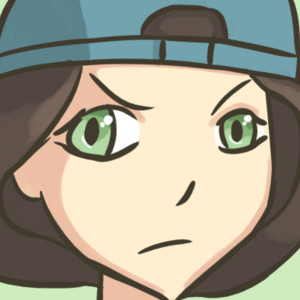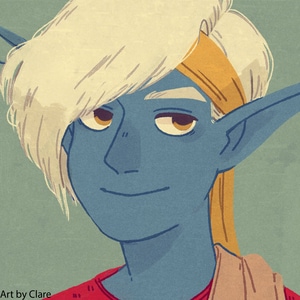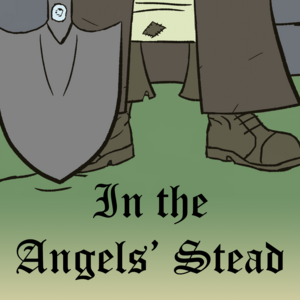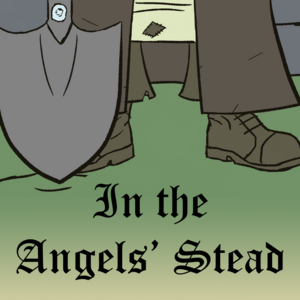Half a mile from the village, following the river, lay the graveyard. Hundreds of stone and wooden markers stretched from the riverbank across a barren field. Ordered in long neat rows, the graveyard was home to many generations of villagers, a testament both to Bekdorf’s age and the Gravedigger’s tireless work. Though the Gravedigger had reused many of the graves over the years, she always added the new occupant’s name beside the previous ones and never removed a name from a marker, ensuring that not a single person would ever be forgotten.
The Gravedigger pushed her cart along the row of graves, Helda and her family following behind. At the end of the row she stopped and lifted a large shovel out of her cart. In contrast to her drab clothes, the shovel she carried was like a treasure from a king’s trove. The polished wooden shaft bore delicate etchings, while the socket attaching the heavy blade was decorated with gold trim and bore a white gemstone on either side. The blade itself was undecorated but finely wrought, bearing not a single scratch or mark of wear.
The shovel looked too large for a person of her size and build, but the Gravedigger used it with ease as she began to dig a new grave at the end of the row. Helda and her family stood by and watched as the young woman worked swiftly and almost effortlessly, shoveling the earth into a pile beside her. When she was finished, the Gravedigger stepped aside and gave a nod to Helda. Bertok and Pieter lifted Tobor’s body out of the cart and gently laid it in the grave. Helda wiped away tears as she and her family stood around the grave, looking for the last time upon the face of her beloved father.
“His trials are over, he has passed from this mortal world,” the Gravedigger said solemnly. “An eternity of peace now awaits him.”
Helda and Bertok raised their hands in prayer and looked up into the bright morning sky, hope mixing with the sorrow on their faces. After several minutes of silence, Helda and her family stepped away from the grave. The Gravedigger took their place and buried the old man’s body beneath the earth.
“By the Angels’ will, rest in peace,” she intoned.
“Thank you,” Helda said softly. The Gravedigger turned and gave her a small smile.
“We’ll fix up a cross for him later today,” Bertok said. He added warmly, “you’re welcome to stay for a meal. We’d be honored to share what we have.”
The Gravedigger smiled and shook her head. “Much appreciated, but I must be moving on.”
Bertok nodded before he, Helda, and their two children set off back towards Bekdorf, leaving the Gravedigger alone in the graveyard. She left her shovel in the cart and wandered among the rows of graves, the names carved on each marker bringing back memories of people she had once known.
The Gravedigger smiled as she passed a simple wooden plank bearing the name Balas; a gruff and taciturn fellow with a heart of gold. One day when an ox went wild and charged a young boy, Balas had thrown himself in its path and been crushed to death, giving the child enough time to escape up a nearby tree. Balas’ less heroic traits included a great fondness for alcohol; his broken nose paid tribute to the many drunken fights he had started.
The Gravedigger paused to pull out a clump of weeds around a stone cross bearing the name Irenka; an herbalist who had moved to Bekdorf from the distant Capital. Though a foreigner she quickly became a respected figure in the community, her medicinal talents saving the lives of many stricken villagers. Why she had chosen to offer her services in this backwater barony rather than make a comfortable living in the Capital was a mystery, though some supposed that persecution or scandal had forced her to leave. Irenka’s stubborn refusal to discuss her past (even on her deathbed) only fueled the villagers’ theories.
The stories of Balas and Irenka, along with the majority of those buried alongside them, had since been forgotten by the people of Bekdorf, separated as they were by many generations.
The Gravedigger stopped by an old grave, marked by a stone slab set into the ground. Carved into the stone were the name and dates: Johan, 1216 - 1280. The man had died 293 years ago. The Gravedigger knelt in front of it, staring down in silence.
“Well, I’m still here, father,” she said softly, “and I still miss you.”
She looked up and across the rows of graves.
“I still miss all of you…” she whispered.












Comments (3)
See all